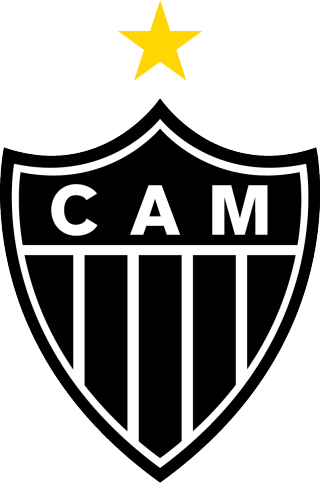
Clube Atlético Mineiro, commonly known as Atlético Mineiro and colloquially as Galo, is a professional football club of Belo Horizonte, the capital city of the Brazilian state of Minas Gerais. The team competes in the Campeonato Brasileiro Série A, the first level of Brazilian football, as well as in the Campeonato Mineiro, the top tier state league of Minas Gerais.
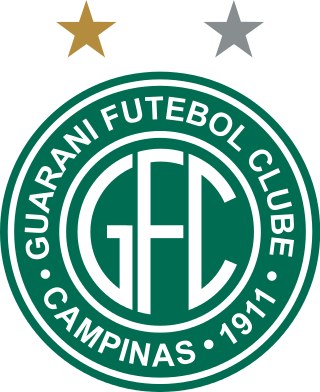
Guarani Futebol Clube, colloquially called Guarani, is a Brazilian association football club in Campinas, São Paulo. Guarani is the only club not based in a state capital or coastal city to have won the top tier of the Brazilian Championship. The team currently play in the Série B, the second tier of Brazilian football, as well as in the Campeonato Paulista Série A1, the top tier of the São Paulo state football league.
Clube dos 13 was the organization responsible for representing the interest of the most powerful football clubs of Brazil, including members from several football state federations such as Federação Paulista de Futebol, Federação de Futebol do Estado do Rio de Janeiro, Federação Gaúcha de Futebol, Federação Mineira de Futebol and Federação Bahiana de Futebol . The organization exists mainly to negotiate radio and television rights of competitions such as the Campeonato Brasileiro. Also Clube dos 13 is responsible for providing a unified voice in negotiations with CBF about the format of the Brazilian competitions.
The Campeonato Brasileiro de Basquete is the annual championship title of the top-tier level men's professional basketball league in Brazil. Over the years, the championship has been held under different leagues. From 1990 to 2008, the top-tier level league competition in Brazil also held the name of Campeonato Brasileiro de Basquete.

The Campeonato Brasileiro Série A, commonly referred to as the Brasileirão, the Série A or the Brazilian Série A, is a Brazilian professional league for men's football clubs. At the top of the Brazilian football league system, it is the country's primary football competition. Contested by 20 clubs, it operates on a system of promotion and relegation with the Campeonato Brasileiro Série B. In 2021, the competition was chosen by the IFFHS as the strongest national league in South America as well as the strongest in the world.

The Brazilian Volleyball Super League is the top level Brazilian professional volleyball competition. It is organized by the Brazilian Volleyball Confederation. It shares the same name with the women's tournament, and are disputed simultaneously. The number of participating clubs varies every year. The champion team qualifies for the South American Championship. Vôlei Natal, who play at the 10,000-capacity Ginásio Nélio Dias, are the current champions.

Fabiana Marcelino Claudino is a Brazilian volleyball player who made her debut for the Brazilian national team against Croatia. She captained Brazil to the gold medal at the 2012 Olympics.

Walewska Moreira de Oliveira was a Brazilian volleyball player in three consecutive Summer Olympics, starting in 2000. She won a bronze medal with the women's national team in Sydney, Australia, and a gold medal in the 2008 Olympics in Beijing. Walewska also claimed the gold medal at the 1999 Pan American Games.
Torneio dos Campeões was an official Brazilian football competition, promoted and organized by CBF in 1982.
Osasco Voleibol Clube is a professional women's volleyball club, based in Osasco, São Paulo (state), Brazil. It includes volleyball teams for females of all ages, children through adult. Since the 2021-22 season the club plays under the name Osasco/São Cristóvão Saúde.
Leites Nestlé or Leite Moça was a Brazilian women's volleyball club representing Sorocaba and Jundiaí, SP, winner of the 1994 FIVB Volleyball Women's Club World Championship. The team played the home games at the Ginásio de Esportes Dr. Nicolino de Lucca, in Jundiaí, SP.
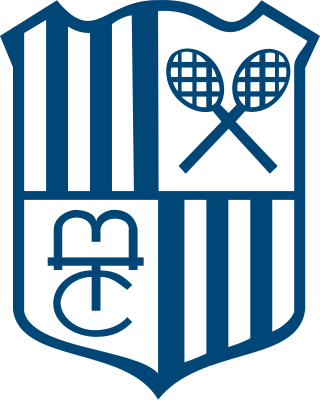
Minas Tênis Clube is a social, recreational and sports club from Belo Horizonte, Brazil. By 2013, it has more than 73,000 members. Its patrimony comprises two urban units, the Minas I and Minas II, and two country units, Minas Country and Minas Tênis Náutico Clube. It also has its own indoor arena, named Juscelino Kubitschek Arena, which is a part of the Minas I complex.
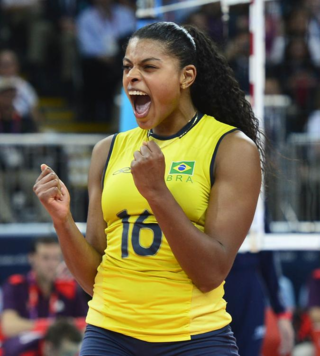
Fernanda Garay Rodrigues is a Brazilian retired professional volleyball player who won the 2012 Summer Olympics gold medal and the silver medal at 2020 Tokyo Summer Olympics with the Brazilian national team. She is 1.79 m tall. She played with Praia Clube.
The 1987 Campeonato Brasileiro Série A was the 31st edition of the Campeonato Brasileiro Série A, better known as Campeonato Brasileiro.

Praia Clube is the professional women's volleyball team from Uberlândia, Minas Gerais which represents the social and sports club of the same name in the Brazilian Superleague. The club currently plays under the commercial name Dentil/Praia Clube.

The Minas Gerais Volleyball Championship is the top level men's and women's volleyball competition in Minas Gerais, Brazil. The first edition happened in 1934 and it has been disputed yearly, with some interruptions. The tournament was initially organized by the Minas Gerais Association of General Sports (AMEG). The Minas Gerais Volleyball Federation was founded in 1942, and has organized all editions since then.

Ana Carolina da Silva is a Brazilian indoor volleyball player. She plays as a Middle blocker and has been a member of the Brazil women's national volleyball team since 2014.

Anne Elise Buijs is a Dutch volleyball player. She has been a member of the Women's National Team since 2008. She is the daughter of Internacional coach and ex-volleyball player Teun Buijs, who trained her for several clubs in her career. Her mother and older brother were also volleyball players. She currently plays for Italian club Reale Mutua Chieri.
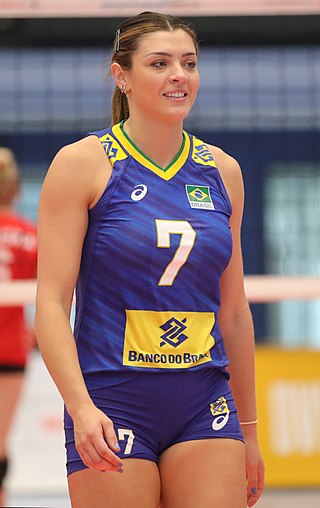
Rosamaria Montibeller is a Brazilian volleyball player. She usually plays as an opposite spiker and occasionally as a wing spiker. A part of Brazil women's national volleyball team ever since winning silver at the 2015 Pan American Games in Toronto, she has since won two medals in the Olympic Games, silver in Tokyo 2020 and bronze in Paris 2024.
The Brazilian Women's Volleyball Superliga 2020–21 - Serie A was the 26th edition of this competition organized by the Brazilian Volleyball Confederation through the National Competitions Unit. It would also be the 42nd edition of the Brazilian Women's Volleyball Championship, the main competition between women's volleyball clubs in Brazil.













